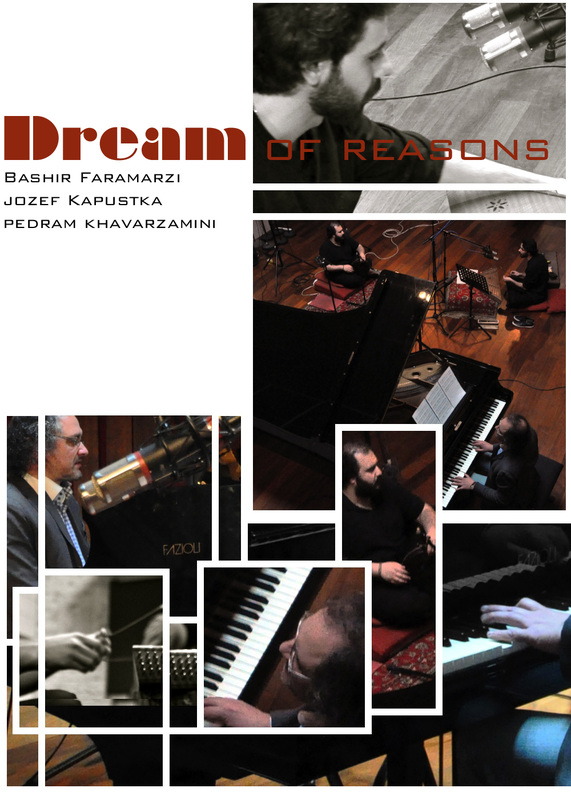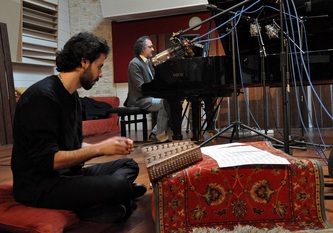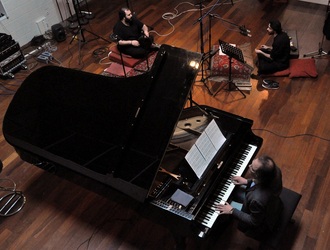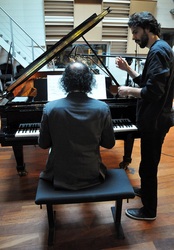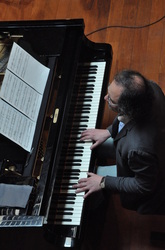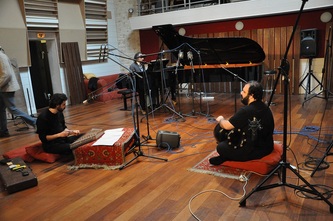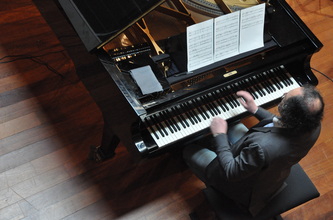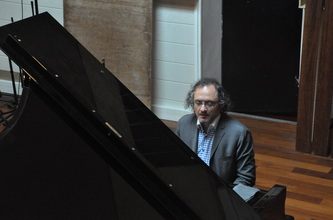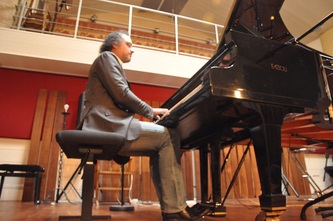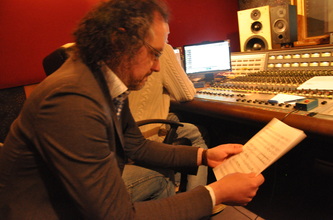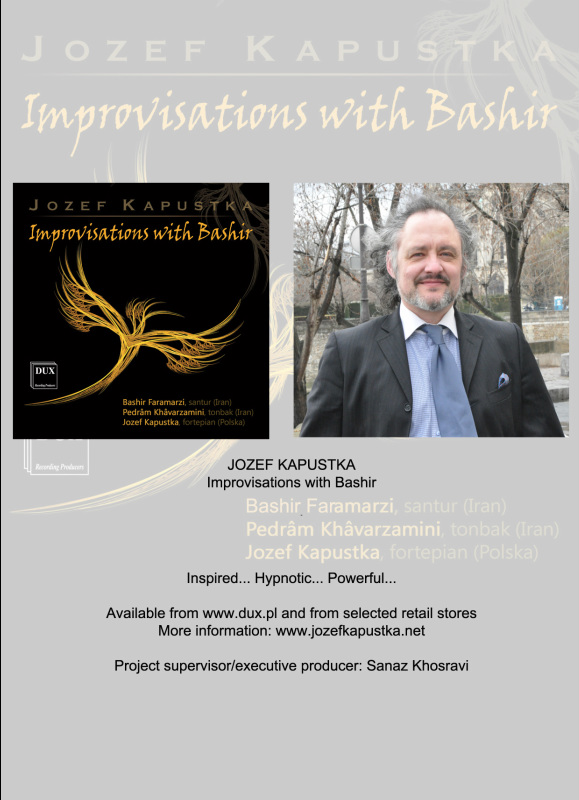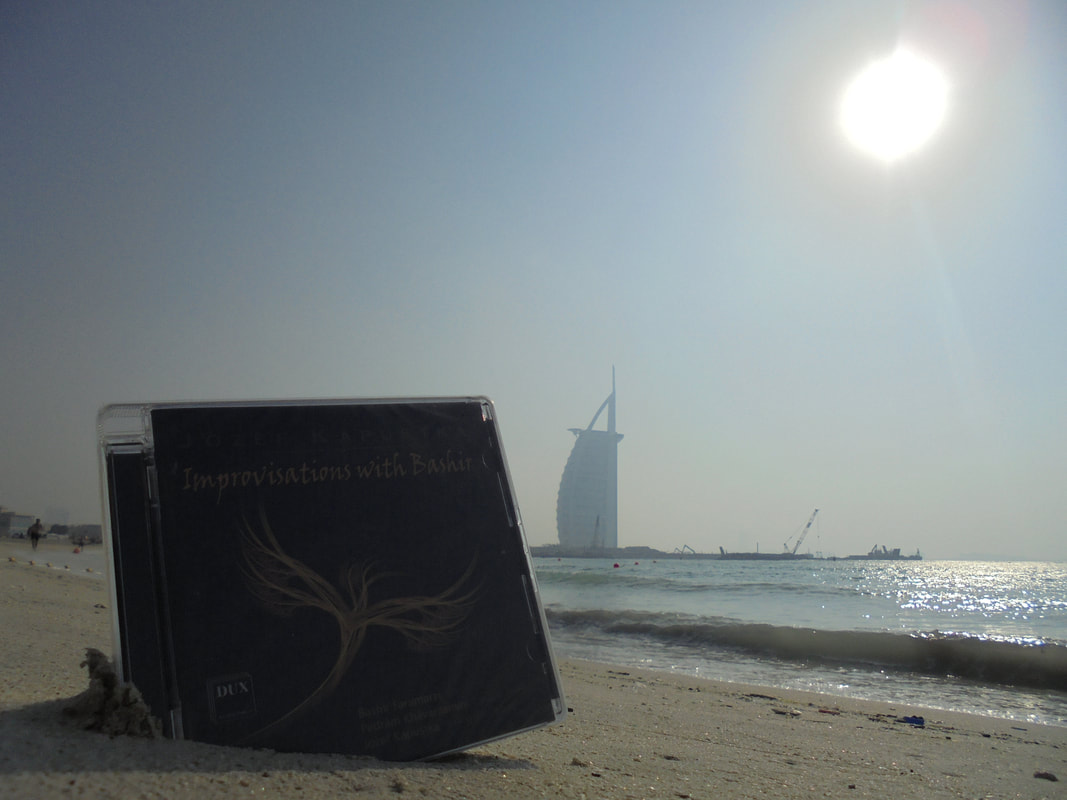image source: dirjournal.com
Improvisations with Bashir Faramarzi (santur) and Pedrâm Khâvarzamini (tonbak)
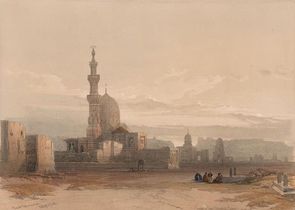
I have tried to create a completely personal universe : my own. It is a rather strange universe for I conveyed images, faces, sounds and scents utterly unfamiliar to many, with all of their mystery. I have been carrying them with me following my many trips to the Maghreb and the Middle East and they have been living in my memory ever since. They are as fragile as desert flowers under samūm and stay alive only as long as my memory lasts. I have also created the original musical language based on altered harmonic, melodic and diatonic scales, motives being exclusively woven around half-tones, tones and augmented tones diffused in a sort of quasi-scriabinesque aura with next to none quotation from the actual sources; all the music being entirely improvised. Although I have no pretention to be accademically correct neither in my approach nor in the way I have chosen my texture to evolve, I have consulted and have been greatly inspired by the landmark " Repertoire of Iraqi maqam" by Prof. Robert Simms of Toronto's York University. I am truly grateful to Jean Francois Zygel (Paris CNSM) for his thoughful insight into the art of improvisation and a constructive criticism of my work. I am proud that Bashir Faramarzi, master santur and dotar player and Persian drum virtuoso Pedrâm Khâvarzamini have joined me on this journey.
What resulted of a fragile encounter, a fertile moment seized instantly is an ephemeral yet completely original and thoroughly contemporary art, full of grace and unsuspected power. It is also a testimony of human and artistic adventure, ad-hoc fusion and exploration of two very different worlds: hypnotic, magic, expansive East and trapped in a profound identity crisis West; all done with genuine passion and within the context of respective classical music traditions and scholarly adequate modes of expression.
Many thanks to Sanaz Khosravi (Iran) for introducing me to her people and culture and Mireille Kassar (Lebanon) for her kindness.
Listen to Bashir Faramarzi and Ensemble Santournavazan : http://www.youtube.com/watch?v=TLotJZoYF74
Listen to Pedrâm Khâvarzamini : http://www.youtube.com/watch?v=2OBvHG8quWI
***** Muzyka21 (Poland) http://www.muzyka21.com
***** Nowa płyta Józefa Kapustki (wyd. DUX), jest nagraniem, które mnie osobiście zaskoczyło… choć może lepszym słowem będzie zafascynowało… i to od pierwszych dźwięków. Mało spotykamy dziś takich nagrań… nagrań bez dwóch zdań natchnionych, metafizycznych i… intymnych?
read full review at http://miko-only-good-music.blogspot.com/2013/05/jozef-kapustka-improvisations-with.html (Polish)
Der gerne beschworene „clash of cultures“ erweist sich hier als eine fruchtbare Begegnung zweier reicher Musikkulturen, die ohne Probleme miteinander musizieren können. Die Verständigung zwischen dem Polen und den beiden Iranern funktioniert, da man sich bei den hier aufge-nommenen Improvisationen der gemeinsamen Sprache der Musik bedienen konnte.
( Note 1, Germany http://www.note-1.de/v3.php?p=3&a=&i=93&s=0#)
What resulted of a fragile encounter, a fertile moment seized instantly is an ephemeral yet completely original and thoroughly contemporary art, full of grace and unsuspected power. It is also a testimony of human and artistic adventure, ad-hoc fusion and exploration of two very different worlds: hypnotic, magic, expansive East and trapped in a profound identity crisis West; all done with genuine passion and within the context of respective classical music traditions and scholarly adequate modes of expression.
Many thanks to Sanaz Khosravi (Iran) for introducing me to her people and culture and Mireille Kassar (Lebanon) for her kindness.
Listen to Bashir Faramarzi and Ensemble Santournavazan : http://www.youtube.com/watch?v=TLotJZoYF74
Listen to Pedrâm Khâvarzamini : http://www.youtube.com/watch?v=2OBvHG8quWI
***** Muzyka21 (Poland) http://www.muzyka21.com
***** Nowa płyta Józefa Kapustki (wyd. DUX), jest nagraniem, które mnie osobiście zaskoczyło… choć może lepszym słowem będzie zafascynowało… i to od pierwszych dźwięków. Mało spotykamy dziś takich nagrań… nagrań bez dwóch zdań natchnionych, metafizycznych i… intymnych?
read full review at http://miko-only-good-music.blogspot.com/2013/05/jozef-kapustka-improvisations-with.html (Polish)
Der gerne beschworene „clash of cultures“ erweist sich hier als eine fruchtbare Begegnung zweier reicher Musikkulturen, die ohne Probleme miteinander musizieren können. Die Verständigung zwischen dem Polen und den beiden Iranern funktioniert, da man sich bei den hier aufge-nommenen Improvisationen der gemeinsamen Sprache der Musik bedienen konnte.
( Note 1, Germany http://www.note-1.de/v3.php?p=3&a=&i=93&s=0#)
" Wszyscy troje wykonawcy to prawdziwi mistrzowie! Nie tylko w sensie technicznym, lecz najszerzej pojetym artystycznym. Wprowadzaja oni sluchacza w swoisty trans. Wykonaywane prze nich kompozycje - improwizacje, to bowiem utwory utrzymane w nurcie repetytywnym, zwracajace uwage swa ostinatowoscia, statycznoscia, nastrojem medytacji, a takze nieco egzotyczna modalnoscia. Od sluchacza wymagaja skupienia, stanu wewnetrznego spokoju i absolutnego otwarcia sie na artystyczny przekaz.
"Chcialem stworzyc swiat radykalnie osobisty, wylacznie moj, swiat tajemniczy, wypelniony obrazami, twarzam, dzwiekami i zapachami, zupelnie nieznanymi dla wiekszosci" - pisze w komentarzu Jozef Kapustka." I rzeczywiscie cel ten zostal osiagniety. ".
Lukasz Kaczmarek, Muzyka21, Poland http://www.muzyka21.com)
"Chcialem stworzyc swiat radykalnie osobisty, wylacznie moj, swiat tajemniczy, wypelniony obrazami, twarzam, dzwiekami i zapachami, zupelnie nieznanymi dla wiekszosci" - pisze w komentarzu Jozef Kapustka." I rzeczywiscie cel ten zostal osiagniety. ".
Lukasz Kaczmarek, Muzyka21, Poland http://www.muzyka21.com)
Olśniewająco zabrzmiała, wydana przez Dux, płyta Józefa Kapustki « Improvisations with Bashir ». Brzmienie cechowała organiczna spójność i otwartość bez cienia jaskrawości. Można się nim było delektować i smakować wybrzmienia. Cieszyć się odgłosami, które wyraźnie odrywały się od smoliście czarnego tła. To granie z innego wymiaru. Jeśli ktoś Wam mówi, ze high-end to nabijanie naiwnych w butelkę , to niemal na pewno nie zetknął się z wybitnym dzwiekiem. Takim, z którym żal się rozstawać i do którego tęskni się miesiącami. Nie tylko w fortepianie Kapustki, ale także w duetach Elli Fitzgerald z Louisem Armstrongiem czy chwytającej za serce IV Symfonii Mahlera
Hi Fi i Muzyka, Jacek Klos we wspolpracy z Piotrem Gorzynskim
Le santour persan, (...) le tombak (...) s'associent au piano pour créer une série d'improvisations. Elles réunissent, dans des harmonies inextricables, les traditions et cultures orientales, perses, arabes et occidentales. On songe parfois aux musiques hypnotiques de Gurdjieff et de Hartmann (...) Inspirateur de ce programme, Jozef Kapustka, fait judicieusement alterner la prima voce entre tel ou tel instrument (...) D'autres caractéristiques encore plus étonnantes surgissent de cette musique (lire le livret). Une découverte intéressante.
Luc Nevers " Rarétes à découvrir - Non curieux s'abstenir! " PIANISTE revue (France)
There seems to be a general movement on both sides to try and salvage, preserve and develop the musical culture of the region at a time when war and political strife mitigate against such concerns. Jozef Kapustka’s Improvisations with Bashir, which sets Kapustka’s piano alongside the santur (a hammered dulcimer) and the tonbak (one of the splendidly onomatopoeic names given to the double-pitched hand drum common throughout the region) before closing with an extensive solo piano workout, is a fine example of this, its slowly developing, restrained extemporizations building sonic structures that seem to shimmer like desert mirages (Dux DUX0942, 51minutes).
Roger Thomas " Contemporary Music on CD - New Listening" , International Record Review
Hi Fi i Muzyka, Jacek Klos we wspolpracy z Piotrem Gorzynskim
Le santour persan, (...) le tombak (...) s'associent au piano pour créer une série d'improvisations. Elles réunissent, dans des harmonies inextricables, les traditions et cultures orientales, perses, arabes et occidentales. On songe parfois aux musiques hypnotiques de Gurdjieff et de Hartmann (...) Inspirateur de ce programme, Jozef Kapustka, fait judicieusement alterner la prima voce entre tel ou tel instrument (...) D'autres caractéristiques encore plus étonnantes surgissent de cette musique (lire le livret). Une découverte intéressante.
Luc Nevers " Rarétes à découvrir - Non curieux s'abstenir! " PIANISTE revue (France)
There seems to be a general movement on both sides to try and salvage, preserve and develop the musical culture of the region at a time when war and political strife mitigate against such concerns. Jozef Kapustka’s Improvisations with Bashir, which sets Kapustka’s piano alongside the santur (a hammered dulcimer) and the tonbak (one of the splendidly onomatopoeic names given to the double-pitched hand drum common throughout the region) before closing with an extensive solo piano workout, is a fine example of this, its slowly developing, restrained extemporizations building sonic structures that seem to shimmer like desert mirages (Dux DUX0942, 51minutes).
Roger Thomas " Contemporary Music on CD - New Listening" , International Record Review
|
.

All rights reserved. Unauthorized reproduction and public performance prohibited
Bashir Faramarzi (santur), Pedram Khavarzamini (tonbak), Jozef Kapustka (piano) sound,mixing and mastering: Thomas Vingtrinier executive producer/artistic director: Sanaz Khosravi producer/sole distributor: Dux (Poland) distribution: Naxos America/Naxos Japan recorded at Sequenza Studio, Paris.2012 http://www.sequenza.fr Piano Fazioli concert grand Flavia Mounaji, singer ( Morocco / Switzerland):
It is stripped of all superficiality, profound. It appears out of nowhere and takes you very far with infinite tenderness, wrapped in a totally fluid and incredibly powerful movement. I love it ! Robert LaPorta, (MSR Classics), former Director of Classics at the Angel-EMI-Virgin Classics-Blue Note label group, Marketing and Production Manager with London-Decca Records, Deutsche Grammophon and Philips Classics of the PolyGram label group and Publicity and Contracts Associate at ICM Artists management in New York, member of Grammy's Classical Commitee (USA): I watched and I listened, and I was fascinated ... |
Excerpts of comments from www.tracktesting.com
This is a beautiful improvisational piece. The left hand rhythms set a mysterious mood while the right hand create an "un-easy" feeling over it. The interpretation is absolutely stunning. Bravo Mr. Kapustka, this was a truly inspirational work. I hope you continue to write more pieces like this.
A fantastic piece of work, really well done, I love it!
source: www.tracktesting.com
Sources:
Read about Persian classical music enjoyed today by people of Greater Persia/Iran :
http://en.wikipedia.org/wiki/Persian_traditional_music
http://en.iransong.com/category.htm?r=t&id=4&
http://www.astaneh.com/Music/
http://en.wikipedia.org/wiki/Music_of_Iran
Rob Simms "The Art of Avaz and Mohammad Reza Shajarian" http://www.amazon.com/The-Avaz-Mohammad-Reza-Shajarian/dp/0739172115
Read about and listen to the Arab classical music:
The AMAR (Arab Music Archiving and Research) Foundation page: http://www.amar-foundation.org/
Traditional and classical Arabic music: http://www.traditionalarabicmusic.com/
Classical Arabic music: http://www.classicalarabicmusic.com/
Arabic Music Archives: http://www.arabicmusicarchives.com/
Arabic classical music - Medieval Music and Arts Foundation page: http://www.medieval.org/music/world/arabic.html
Suleman Taufiq (Syria) Arabic music and its development, an overview (published by Goethe Institut): http://www.goethe.de/ges/phi/prj/ffs/the/a96/en8626486.htm
Arab music genres: http://www.al-bab.com/arab/music/genres.htm
http://en.wikipedia.org/wiki/Persian_traditional_music
http://en.iransong.com/category.htm?r=t&id=4&
http://www.astaneh.com/Music/
http://en.wikipedia.org/wiki/Music_of_Iran
Rob Simms "The Art of Avaz and Mohammad Reza Shajarian" http://www.amazon.com/The-Avaz-Mohammad-Reza-Shajarian/dp/0739172115
Read about and listen to the Arab classical music:
The AMAR (Arab Music Archiving and Research) Foundation page: http://www.amar-foundation.org/
Traditional and classical Arabic music: http://www.traditionalarabicmusic.com/
Classical Arabic music: http://www.classicalarabicmusic.com/
Arabic Music Archives: http://www.arabicmusicarchives.com/
Arabic classical music - Medieval Music and Arts Foundation page: http://www.medieval.org/music/world/arabic.html
Suleman Taufiq (Syria) Arabic music and its development, an overview (published by Goethe Institut): http://www.goethe.de/ges/phi/prj/ffs/the/a96/en8626486.htm
Arab music genres: http://www.al-bab.com/arab/music/genres.htm
Persian music after the Islamic conquest
from : Classical Persian Music by Ella Zonis
Islamic conquest and cultural influence
With the coming of Islam to Iran there occurred a most important confluence of two musics, Arabian and Persian. A closeness between them persisted for at least two centuries, especially during the Golden Age of the Abbasid caliphate at Baghdad.
Historians of Persian art are fond of the doctrine that the Arabs, coming straight from the desert to a more advanced civilization in Persia, adopted
the art and music of the vanquished culture. Moreover, Persian musicians claim that Persian music must have strongly influenced Arabian
music because Persian musicians were favored in the Arab royal courts, Persian instruments were introduced, and a great deal of Persian musical terminology came into Arabic music. Arab musicians, on the other hand, feel that their music was the basis for Persian music because there are equally as many Arabic words used in Persian music terminology.
The Islamic period produced more writings on music than any other.
The monumental Kitab al Aghani by Abul Faraj al-Isfahani (897-967), now in a twenty-one volume edition, lists the virtuosi of the period and the music they played—a sort of Grove's dictionary of the day.
During the twelfth century, many works of Farabi (873-950) and Avicenna or Ibne Sina (980-1037), translated into Latin, were used in European Universities. Among his several works on music, the greatest is the Kitab al musiqi al Kabir (Grand Book on Music) in which Farabi discusses every known aspect of music.
Islamic conquest and cultural influence
With the coming of Islam to Iran there occurred a most important confluence of two musics, Arabian and Persian. A closeness between them persisted for at least two centuries, especially during the Golden Age of the Abbasid caliphate at Baghdad.
Historians of Persian art are fond of the doctrine that the Arabs, coming straight from the desert to a more advanced civilization in Persia, adopted
the art and music of the vanquished culture. Moreover, Persian musicians claim that Persian music must have strongly influenced Arabian
music because Persian musicians were favored in the Arab royal courts, Persian instruments were introduced, and a great deal of Persian musical terminology came into Arabic music. Arab musicians, on the other hand, feel that their music was the basis for Persian music because there are equally as many Arabic words used in Persian music terminology.
The Islamic period produced more writings on music than any other.
The monumental Kitab al Aghani by Abul Faraj al-Isfahani (897-967), now in a twenty-one volume edition, lists the virtuosi of the period and the music they played—a sort of Grove's dictionary of the day.
During the twelfth century, many works of Farabi (873-950) and Avicenna or Ibne Sina (980-1037), translated into Latin, were used in European Universities. Among his several works on music, the greatest is the Kitab al musiqi al Kabir (Grand Book on Music) in which Farabi discusses every known aspect of music.
Music in Iran today
The situation of music in Iran since the Revolution, British Journal of Ethnomusicology, Vol.9, No. 2, 2000: http://www.jstor.org/discover/10.2307/3060645?uid=3738032&uid=2129&uid=2&uid=70&uid=4&sid=21103012758221
Somayeh Ghazizadeh ( Islamic Azad University),Cultural changes of Iranian music after Islamic Revolution: http://www.ipedr.com/vol20/74-ICHSC2011-M20058.pdf
Ameheh Youssefzadeh, The status of music in the Islamic Republic of Iran: http://fis-iran.org/en/irannameh/volxix/iran-status-music
The Guardian article "Something inside so strong": http://www.theguardian.com/music/2009/jan/16/popandrock-freedom-of-speech
Iran's Supreme Leader bans music: http://www.theguardian.com/world/2010/aug/02/iran-supreme-leader-music-islam
read Sasha von Oldershausen blog for personal perspective on contemporary and future Iran
Somayeh Ghazizadeh ( Islamic Azad University),Cultural changes of Iranian music after Islamic Revolution: http://www.ipedr.com/vol20/74-ICHSC2011-M20058.pdf
Ameheh Youssefzadeh, The status of music in the Islamic Republic of Iran: http://fis-iran.org/en/irannameh/volxix/iran-status-music
The Guardian article "Something inside so strong": http://www.theguardian.com/music/2009/jan/16/popandrock-freedom-of-speech
Iran's Supreme Leader bans music: http://www.theguardian.com/world/2010/aug/02/iran-supreme-leader-music-islam
read Sasha von Oldershausen blog for personal perspective on contemporary and future Iran
Your browser does not support viewing this document. Click here to download the document.
|
در این پروژه من تلاش برای خلق دنیای شخصی خودم کرده ام. "سموم" باد بیابان است، فضای عجیبی است به خاطر همین برای بیان عجایب تصاویر، چهره ها، صداها، بوها و اشیاء که آنها به شکندگی گلهای بیابان هستند، در عین حال برای بسیاری از ما کاملا ناشناخته اند و در خاطر من به دنبال سفرهایم از مغرب تا خاور میانه، از زمانهای دور
زنده هستند. من را بر این داشت با الهام از "مجموعه ی مقام های عراقی" و مشورت با پروفسور رابرت سیممس دردانشگاه یورک تورنتو ، نقطه ی عطفی برای بیان و ارائه آن دوران خلق کنم . همراه داشتن دوستان ایرانی، استاد سنتور، دوتار بشیر فرامزی و استاد تنبک، پدرام خاورزمینی باعث افتخار من در به حقیقت رساندن این پروژه میباشد. و شما را برای همراه شدن در این سفر فرا میخوانم. |
|
|
|
.All copyrights for the pictures on this page belong to their respective owners.
"Jozef Kapustka: Improvisations with Bashir" are available for sale in these selected retail stores worldwide:
producer/ sole distributor: Dux Record Producers, Poland
http://www.dux.pl/wyszukiwanie_pelne/wyniki/podglad/?pid=653
producer/ sole distributor: Dux Record Producers, Poland
http://www.dux.pl/wyszukiwanie_pelne/wyniki/podglad/?pid=653
Buy "JOZEF KAPUSTKA: Improvisations with Bashir" on CD Universe http://www.cduniverse.com/productinfo.asp?pid=8980865
More reading in Persian (Farsi):
http://www.jarchi.ir/up/Impros-with-Bashir-Faramarzi-and-Pedram-Khavarzamini-Jozef-
http://article.wn.com/view/WNATbfa8f0b1f94fc42345847db92da903c7/#/related_news
More reading in Persian (Farsi):
http://www.jarchi.ir/up/Impros-with-Bashir-Faramarzi-and-Pedram-Khavarzamini-Jozef-
http://article.wn.com/view/WNATbfa8f0b1f94fc42345847db92da903c7/#/related_news
copyrights for all images on this page belong to their respective owners
